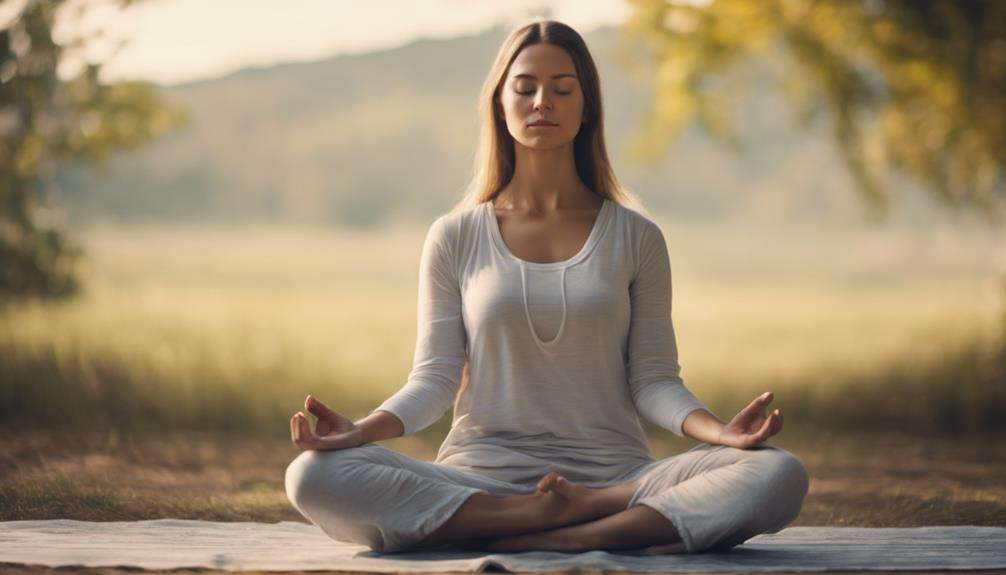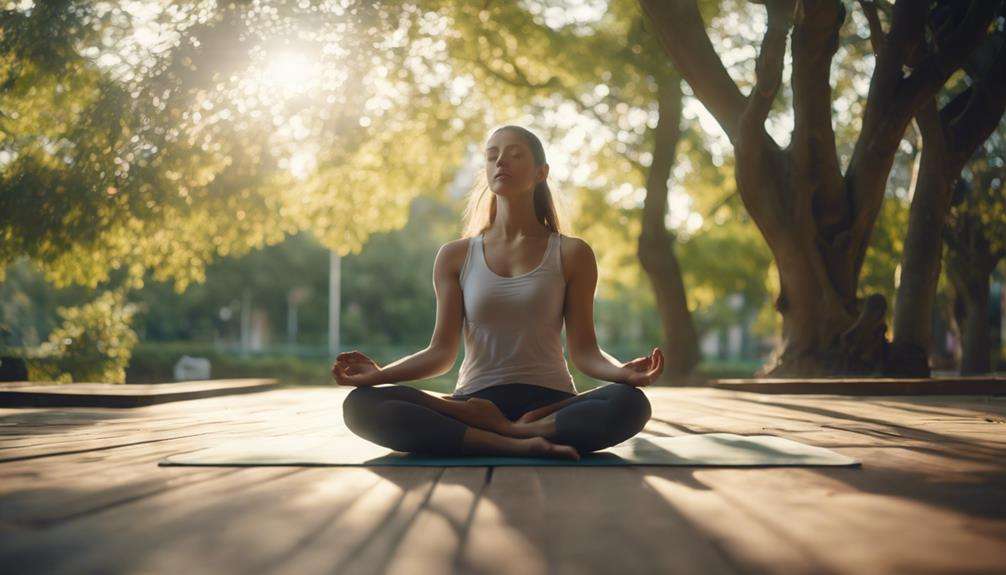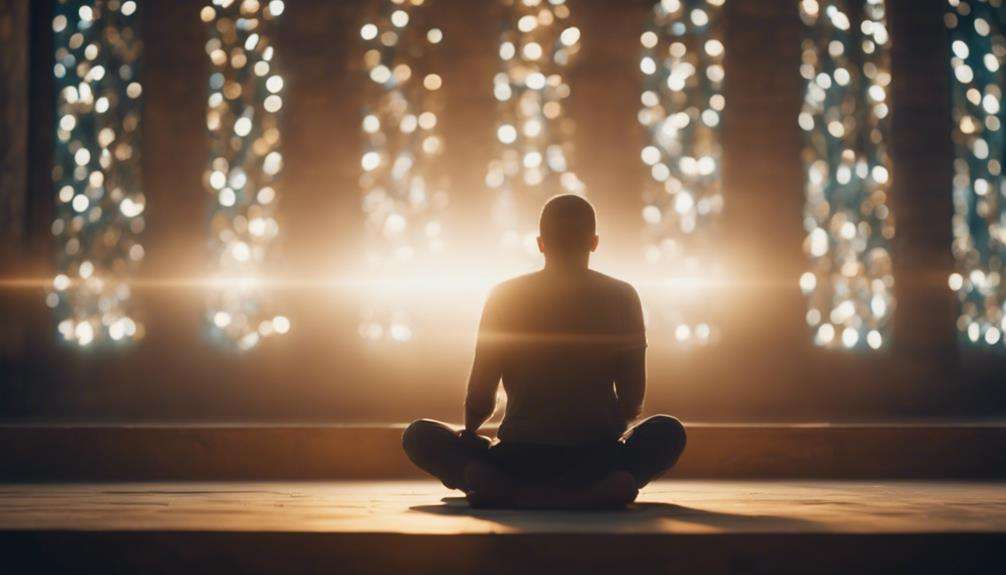When navigating the tumultuous waters of anxiety, mindfulness meditation acts as a steady anchor that can guide you through the storm. By honing in on the power of your breath and the gentle embrace of the present moment, mindfulness meditation offers a sanctuary amidst the chaos of anxious thoughts.
But how exactly can these techniques be harnessed to provide relief when anxiety strikes? The answer lies in the intricate dance between mind and body, a harmonious symphony awaiting your exploration.
Key Takeaways
- Mindfulness meditation reshapes brain regions, enhancing emotional regulation.
- Techniques like mindful breathing and loving-kindness improve anxiety symptoms.
- Body scan and guided meditations foster relaxation and resilience.
- Consistent mindfulness practice boosts overall well-being and anxiety management.
Benefits of Mindfulness Meditation for Anxiety
Mindfulness meditation offers significant benefits for alleviating anxiety by actively reshaping brain regions associated with emotion regulation and enhancing self-awareness through increased gray matter density. By practicing mindfulness, you can cultivate emotional regulation, concentration, and resilience to anxiety triggers.
Studies have shown that integrating mindfulness into your daily routines, such as through mindful eating or setting aside specific practice times, can aid in anxiety relief. This practice can also lead to enhanced connectivity in brain networks related to attention and cognitive control, which are beneficial for managing anxiety.
Mindfulness meditation not only reduces symptoms of anxiety disorders but also helps in increasing gray matter density in brain regions associated with self-awareness. By incorporating mindfulness into your life, you can tap into its transformative power to navigate and alleviate the grip of anxiety, fostering a sense of inner peace and well-being.
Techniques for Mindful Breathing
To deepen your mindfulness practice and further alleviate anxiety, explore various techniques for mindful breathing, a powerful method that promotes relaxation and emotional balance.
Mindful breathing involves focusing on the natural flow of your breath, helping to reduce anxiety and calm the body. Research indicates that this practice can lower cortisol levels, improving emotional regulation and fostering self-awareness.
By incorporating mindful breathing exercises into your routine, you can increase concentration, build resilience to anxiety triggers, and redirect attention from anxious thoughts towards the present moment, creating a sense of grounding.
Through the cultivation of awareness of your breath, you can attain inner peace and diminish the impact of anxiety on your well-being. Embrace mindful breathing as a tool for managing anxiety, allowing yourself to find moments of tranquility and balance amidst life's challenges.
Loving-Kindness Meditation for Anxiety Relief

Cultivate feelings of compassion and love towards yourself and others through Loving-Kindness Meditation, also known as Metta meditation. This practice focuses on generating positive emotions like kindness, empathy, and love to counteract feelings of anxiety and negativity.
Here's how Loving-Kindness Meditation can help with anxiety relief:
- Increased Compassion: By directing loving-kindness towards yourself and others, you can cultivate a sense of compassion that helps in reducing anxiety levels.
- Enhanced Emotional Resilience: Regular practice of Loving-Kindness Meditation can strengthen emotional resilience, enabling you to cope better with stress and anxiety triggers.
- Promotion of Well-Being: Research suggests that this meditation technique can improve overall well-being by fostering positive emotions and reducing anxiety symptoms.
- Interconnectedness: Through Metta meditation, you can develop a sense of interconnectedness with others, which can provide a source of support and comfort during anxious times.
Incorporating Loving-Kindness Meditation into your routine can promote self-compassion, enhance emotional well-being, and alleviate anxiety, ultimately leading to a more balanced and grounded state of mind.
Body Scan Meditation for Relaxation
Transitioning from loving-kindness meditation to body scan meditation can offer you a different approach to relaxation and awareness of your body's sensations. Body scan meditation involves systematically focusing on different body parts to promote relaxation and awareness.
By paying attention to physical sensations, you can release tension, improve the body-mind connection, and reduce symptoms of anxiety. This practice directs your awareness to each part of your body, helping you alleviate stress and cultivate mindfulness.
Through body scan meditation, you can enhance self-awareness and foster a sense of calmness throughout your body. This technique is commonly utilized in mindfulness-based interventions for anxiety relief and overall well-being.
Guided Meditation for Anxiety Management

Embark on a journey towards managing your anxiety with the guidance of meditation techniques tailored to enhance calmness and focus. Guided meditation for anxiety management involves following verbal instructions to stay centered and ease the mind, making it especially beneficial for beginners seeking relief from anxious thoughts.
Here's what you can expect from guided meditation sessions:
- Verbal Guidance: Instructors offer step-by-step directions to help you maintain focus and reduce anxiety.
- Stress Reduction: Research indicates that guided meditation can lower stress levels and improve overall mental well-being.
- Tailored Practices: Sessions often include visualization exercises, body scans, and specific breathing techniques aimed at anxiety relief.
- Inner Peace: Regular practice can cultivate a sense of tranquility and resilience, empowering you to better navigate anxiety triggers and find inner peace amidst life's challenges.
Progressive Muscle Relaxation (PMR) for Calmness
Are you looking to ease your anxiety and find a sense of calm?
Progressive Muscle Relaxation (PMR) offers a structured approach to help you release physical tension and promote relaxation in your body.
Muscle Tension Awareness
To attain a state of calmness and reduce anxiety, engaging in Progressive Muscle Relaxation (PMR) fosters heightened muscle tension awareness through a deliberate practice of tensing and relaxing specific muscle groups. Here's how PMR can help you:
- Increase Body Awareness: By focusing on different muscle groups, PMR enhances your sensitivity to bodily sensations, promoting a stronger mind-body connection.
- Reduce Muscle Tension: The intentional tensing and releasing of muscles during PMR can help alleviate physical tension, a common symptom of anxiety.
- Lower Stress Levels: Through systematic muscle relaxation, PMR triggers the body's relaxation response, leading to decreased stress levels.
- Enhance Relaxation: Research supports PMR's effectiveness in reducing anxiety and promoting overall relaxation when practiced regularly.
Sequential Muscle Relaxation
Tuning into your body's signals can be a powerful way to cultivate relaxation and ease tension, which Sequential Muscle Relaxation, also known as Progressive Muscle Relaxation (PMR), aims to achieve.
By systematically tensing and relaxing different muscle groups, PMR helps reduce overall tension and promote calmness. This scientifically proven technique is effective for managing anxiety symptoms, enhancing body awareness, and improving sleep quality.
Regular practice of PMR can lead to a significant reduction in muscle tension, allowing you to experience a profound sense of relaxation. Integrating PMR into your daily routine as a mindfulness relaxation technique can provide valuable support for anxiety relief and overall well-being.
Start today and feel the benefits of this simple yet powerful practice.
Breathing and Releasing
Engage in the practice of Breathing and Releasing as part of Progressive Muscle Relaxation (PMR) to cultivate calmness and reduce anxiety effectively. Progressive Muscle Relaxation (PMR) involves tensing and releasing specific muscle groups to promote relaxation and reduce anxiety.
Here are four ways Breathing and Releasing can help you manage anxiety and enhance your well-being:
- Focus on your breath to center yourself and release tension.
- Systematically tense and release muscle groups to promote relaxation.
- Increase body awareness by paying attention to the sensations in your muscles.
- Improve sleep quality and reduce stress levels by incorporating Breathing and Releasing into your daily routine.
Frequently Asked Questions
What Is the 3 3 3 Rule Anxiety?
When you feel anxious, the 3 3 3 rule can help. Name three things you see, hear, and feel. Grounding techniques like this distract from worries, reducing panic. It's quick and effective for managing anxiety.
How to Do Mindfulness Meditation for Anxiety?
To do mindfulness meditation for anxiety, start by finding a quiet space. Begin with deep breathing to center yourself. Follow with a body scan, grounding techniques, and visualization exercises. Incorporate loving kindness, mantra meditation, and progressive relaxation.
What Is the Best Meditation for Anxiety?
For anxiety, breathing exercises, visualization, body scan, and more are effective. Practice regularly to find what works best for you. Stay present, be kind to yourself, and explore various techniques to manage anxiety.
What Are 3 Coping Strategies for Anxiety?
When feeling anxious, try deep breathing for calm, progressive muscle relaxation for tension relief, and positive affirmations for reassurance. These coping strategies can help you manage anxiety effectively and promote emotional well-being.
Conclusion
As you continue to practice mindfulness meditation techniques, imagine yourself as a calm and peaceful lake, reflecting the beauty of the present moment.
Let go of anxiety like ripples on the water, embracing a sense of inner peace and serenity.
With each breath, feel the weight of worry lift from your shoulders, leaving you feeling grounded and centered.
Trust in the power of mindfulness to guide you towards a life free from anxiety and full of tranquility.






